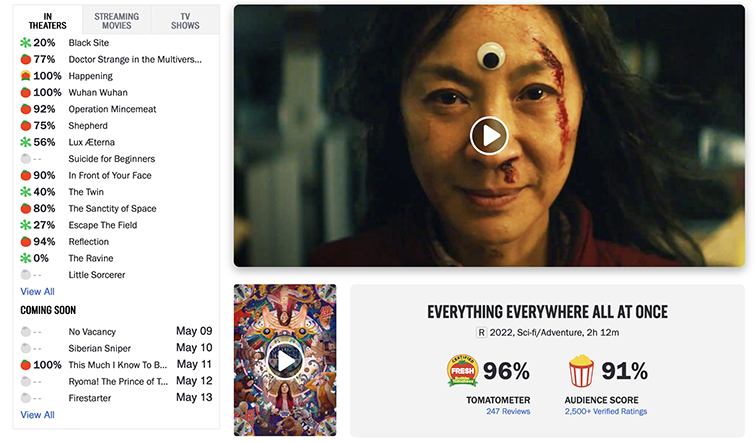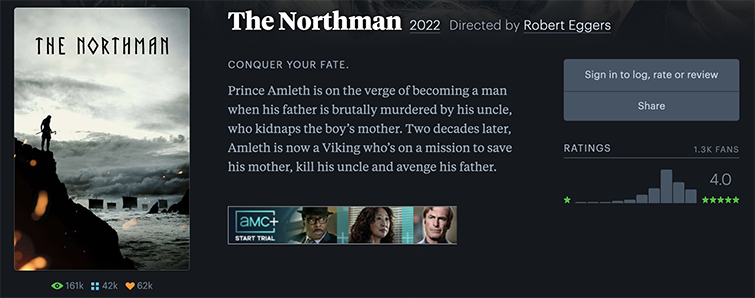
Have Audience Scores Lost Their Merit?
Let’s take a look at the pros and cons of how critics and audience film scores are shaping the film industry.
Let’s face it, the number one goal for the vast majority of us who work in film is to one day make a movie. You know, a real feature film that plays in movie theaters, gets reviews, and ultimately (hopefully) makes money.
But, while there are certainly plenty of steps to consider along the way (namely, all of those that have to do with how to write, shoot, and edit your films), there’s one element that might be entirely out of our control. How will audiences and critics react to our projects?
Since the age of the film critic has largely come and gone, we now have a new ecosystem that decides which films are well-received and which ones are dubbed flops.
But, what is this new system? And, how might it potentially (and eventually) affect any films you hope to make?
Let’s look at the current state of “audience score” culture to see how it works (or perhaps doesn’t work) today.
Which Scores Still Matter?
As a Millennial who grew up on the cusp of the internet era, it’s kind of fascinating to look back at how people must have heard about movies and reviews. There were no Rotten Tomato websites to check “scores” before deciding what to see. Instead, newspaper reviews and critic picks were part of your nightly television news programs or magazine subscriptions.
Oh, and there was also word of mouth. You know, like talking to your friends and family and hearing about their lives and what movies they’d seen recently.
Still, as internet culture has progressed (or, taken over), these old ways of hearing about movies have drastically shifted from recommendations towards more cumulative measurements (thus, audience scores).
Yet, even those aren’t exact, and each one comes with its own grain of salt to keep in mind. Let’s look at some of the audience score metrics currently dominating the landscape.
IMDb Score

I can’t remember the first time I ever visited IMDB.com. Still, I can certainly remember the moment when, in college, meeting new friends for the first time, it was brought up in casual conversation as a place we all went to settle arguments about which actors were in which films.
And, as the Internet Movie Database (IMDb) has grown over the years, its system for rating movies has similarly grown in popularity and importance. While perhaps not the be-all, end-all score system for movies, its Top 100 list might be one of the most influential lists on the internet.
Its system is still pretty simple, though. Pulling info directly from the site, IMDb states that any “IMDb registered users can cast a vote from 1 to 10 on every released title in the database.” These votes are then aggregated into a single IMDb rating next to every film’s title.
As far as audience score metrics go, this one is perhaps the most basic and most indicative of the macro-mainstream sensibilities, yet perhaps the easiest to artificially inflate or deflate depending on who wants to create enough additional accounts to sway a score.
Likewise, you’ll often find films that climb the ladder organically will start being bombarded with lower scores to avoid the film overtaking a certain group’s “favorite.”
The Shawshank Redemption, for example, has often maintained the number one spot for many years. However, upon inspection of the ratings, you’ll find that it has over 39,000 1/10 ratings, but only 4,900 2/10 ratings.
While I’m sure some of these ratings are from disgruntled viewers who simply didn’t like the film, it’s more likely that the onslaught of the low scores comes from users trying to sink the rating of the film to dislodge it from the top spot.
You’ll see this throughout countless films within the top 100, and I have to ask, doesn’t that completely negate the authenticity of this list?
Rotten Tomatoes Score

Moving on to perhaps the most famous and recognizable audience score metric, the Rotten Tomatoes score system (also called the Tomatometer®) almost overnight went from a fun, gimmicky website to a powerhouse within the film industry.
Like IMDb, I don’t personally remember the first time I went to the Rotten Tomatoes website. Still, I remember the first time I saw a Rotten Tomatoes score listed in a television commercial to promote the film. It’s become that powerful of a metric, yet it still feels a bit flawed at its core.
Unlike IMDb, which is open to anyone, Rotten Tomatoes divides its scores into its Tomatometer (which is “based on the opinions of hundreds of film and television critics”) and an Audience Score (which is cast by users who can verify that they bought a ticket to the film).
Originally, the critical Tomatometer was the dominant score metric in the film industry (and perhaps still is today). It does a good job of sifting through recognized critics across the world to get somewhat of a consensus.
Yet, in recent years, the idea of critics being the true gatekeepers of what defines a film as “good” or “bad” has come under scrutiny more and more, and the Audience Score has become a necessary tool to offer more of a counterbalanced and holistic decider of a film’s success.
Like IMDb, you’ll often see users organizing a suggested coup of a film’s audience rating through a method called “review bombing.” This is where countless internet users rate the film poorly the moment the audience scores go live to lower the film’s rankings.
And, I think that’s my general problem with both IMDb and Rotten Tomatoes. The platforms seem like they’re propriety tools for childish internet drama rather than a platform to rate films. It seems like every movie is often either rated 1 or 10.
Letterboxd Audience Scores

Fortunately, it’s not just IMDb and Rotten Tomatoes out there compiling scores based on simple numbers. One of the best websites to come out in recent years for cinephiles and filmmakers alike, Letterboxd might be one of the best answers for those looking for metrics, but with a more social aspect to the system.
Founded back in 2011, Letterboxd has quietly grown into a full-blown community of more serious-minded, yet still passionate, film fans who love to share their thoughts, opinions, and think pieces on what they love about their favorite films.
The site does have a score element (based on compiling scores from all registered users on a star scale from 1 to 5). However, the way the site socially connects each review with the actual user writing the review helps keep it more organic and sincere.
Unlike the IMDb and Rotten Tomato scores, viewing the Letterboxd score feels much less important than reading some of the write-ups of the film featured on a film’s page.
I’ve personally found myself going to Letterboxd far more often than any other sites to join the discussion about a favorite film—much in the way IMDb’s message boards worked before they were taken down in favor of the more brutalist point system.
What Should You Consider?
So, what do these different sites and score types mean for the industry? Sadly, for one thing, it does seem like these scores have replaced the impotence of the local film critic in favor of a faceless representation of the mainstream consensus.
I’m glad Rotten Tomatoes (at least) has the Audience Score to help counterbalance the critical consensus. But, in general, the concept of reducing any film—whether considered “good,” “bad,” or “somewhere in-between”—down to a single number is quite a reduction and a bit problematic.
This is especially true for filmmakers just starting. For example, if you do make a feature or short film that makes it to a festival big enough that it can garner some critical reviews, its Rotten Tomatoes score will be a massive dictator in whether or not your project is deemed a success or not.
However, on the flip side, I’m not entirely convinced that the systems we had prior to audience scores were much better before. At least this macro consensus does include everyone (everyone with internet access) instead of a select group of critics.
There are also slightly more holistic websites aggregating reviews, like Letterboxd, to check out. Filmmakers should lean into more and more into this as a way to get better reviews of their projects and films, build their brands, and contribute to the greater film community.
Regardless of how you feel, at the end of the day any filmmaker would be best served by logging offline altogether and working on honing your storytelling skills, developing your filmmaking craft, and simply doing projects that you care about.
Check out these articles and resources below for more tips and tricks on actually getting out there and making films.
- Why Student Filmmakers Should Watch Movies with Subtitles On
- Is Rotoscope Animation Back? (And How to Get Started Today)
- Making Your Own Fantasy Film: A Field Guide
- Is Greig Fraser The New Roger Deakins?
- Color Grading Freebie: 65+ Free Premiere Pro Looks
Cover image via fullvector.





